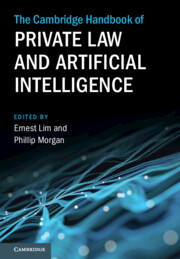Book contents
- The Cambridge Handbook of Private Law and Artificial Intelligence
- Reviews
- The Cambridge Handbook of Private Law and Artificial Intelligence
- Copyright page
- Dedication
- Contents
- Figures
- Table
- Contributors
- Acknowledgements
- Abbreviations
- Introduction
- 1 AI for Lawyers
- 2 Computable Law and AI
- Part I Law of Obligations
- 3 Contract Law and AI
- 4 Self-Driving Contracts and AI
- 5 Consumer Protection Law and AI
- 6 Tort Law and AI
- 7 Automated Vehicle Liability and AI
- 8 Legal Causation and AI
- 9 Product Liability Law and AI
- 10 Appropriation of Personality in the Era of Deepfakes
- 11 Agency Law and AI
- 12 Trust Law and AI
- 13 Unjust Enrichment Law and AI
- Part II Property
- Part III Corporate and Commercial Law
- Part IV Comparative Perspectives
- Index
10 - Appropriation of Personality in the Era of Deepfakes
from Part I - Law of Obligations
Published online by Cambridge University Press: 21 March 2024
- The Cambridge Handbook of Private Law and Artificial Intelligence
- Reviews
- The Cambridge Handbook of Private Law and Artificial Intelligence
- Copyright page
- Dedication
- Contents
- Figures
- Table
- Contributors
- Acknowledgements
- Abbreviations
- Introduction
- 1 AI for Lawyers
- 2 Computable Law and AI
- Part I Law of Obligations
- 3 Contract Law and AI
- 4 Self-Driving Contracts and AI
- 5 Consumer Protection Law and AI
- 6 Tort Law and AI
- 7 Automated Vehicle Liability and AI
- 8 Legal Causation and AI
- 9 Product Liability Law and AI
- 10 Appropriation of Personality in the Era of Deepfakes
- 11 Agency Law and AI
- 12 Trust Law and AI
- 13 Unjust Enrichment Law and AI
- Part II Property
- Part III Corporate and Commercial Law
- Part IV Comparative Perspectives
- Index
Summary
Deep fakes are a special kind of counterfeit image that is difficult to distinguish from an authentic image. They may be used to represent a person doing any act and are generated using advanced machine learning techniques. Currently, such an appropriation of personality is only actionable if the circumstances disclose one of a number of largely unrelated causes of action. As these causes of action are inadequate to protect claimants from the appropriation of their personalities, there should be a new independent tort or statutory action for the appropriation of personalities which is grounded in the protection of a person’s dignitary interests.
- Type
- Chapter
- Information
- Publisher: Cambridge University PressPrint publication year: 2024

